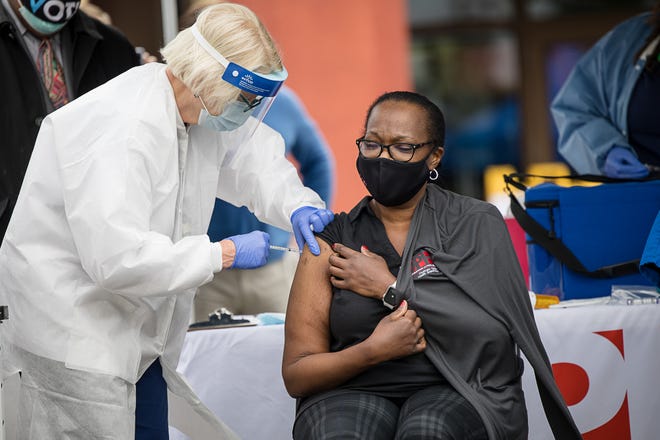By Katja Ridderbusch
When Randall Hampton got his first dose of Pfizer’s coronavirus vaccine in mid-January, he asked the nurse to give him the booster shot right away. “But they wouldn’t do it,” he says, shrugging his shoulders. “They wanted me to come back three weeks later.” (As eager as he was, the wait is standard protocol.)
Hampton is 70 and African-American. He is a longtime member of First Baptist Church of Decatur, where he coordinates the early morning services, drives the bus, and does security. He’s had several friends die of COVID-19. They probably wouldn’t have if the vaccine had been available, he says.
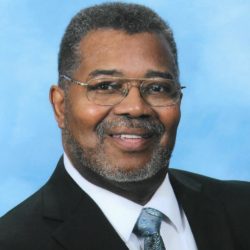
“I really could not wait to get the shot,” he says. He read up on the vaccine in medical journals, looked at the data and information published on the CDC’s and his church’s website. “I’ve done my research. And for me, it’s the right thing to do.”
At first glance, Randall Hampton seems at odds with a trend that has public health officials concerned: vaccine hesitancy among African-Americans, a population that is more likely to get hospitalized with COVID, and more likely to die from the disease.
Forty-three percent of Black adults say they would rather “wait and see” before getting vaccinated, compared to 31 percent in the general population, according to a recent Kaiser Family Foundation (KFF) survey. That’s down 9 percentage points from December. Twenty-one percent say they would definitely not get inoculated, unless required to do so for work, school or other activities.
While there are early signs of a decline in vaccine reluctance, actual vaccination statistics so far have shown a stark disparity in the percentages of African-Americans receiving shots.
According to a new demographic analysis from the CDC, Blacks and Hispanics are underrepresented among people vaccinated in the United States. In the first month of the national vaccine rollout, only 5.4 percent of recipients were Black, and 11.5 percent were Hispanic, although those demographic groups make up 13.4 and 16.7 percent of the population, respectively.
A KFF analysis from early February found that in 23 states releasing data by race, white residents were being vaccinated at significantly higher rates than Black residents, in many cases two to three times higher. Georgia is among the states that are not yet reporting vaccinations by race/ethnicity, according to KFF. Georgia officials say they are collecting this information, and will include it soon when the Public Health website is updated.
One of several strategies to boost inoculation rates among Black and Hispanic communities is “a concerted effort” to understand hesitancy and build confidence in the vaccine, says Dr. Tabia Henry Akintobi, a professor of Community Health and Preventive Medicine at Morehouse School of Medicine.
Morehouse, a historically Black college – along with Emory University, the DeKalb County Board of Health and other Georgia-based health institutions – is part of the NIH’s Community Engagement Alliance, a nationwide program that’s focused on outreach and engagement in ethnic and racial minority communities.
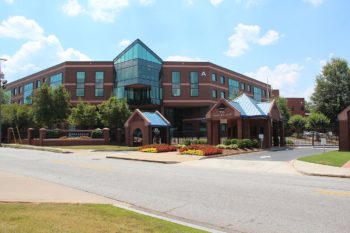
In order to break through to those communities, Akintobi says “it takes not only messages that resonate. It takes, more importantly, trusted messengers.”
For the African-American community in particular, among the most trusted messengers are churches. Pastors are influencers. “Churches are a source of information, a refuge, a safe place to ask questions and share concerns,” says Akintobi. “Their role is priceless.”
That’s why health care institutions across the country and the state are partnering with faith organizations to help encourage vaccination. For example, Augusta University Health works closely with local churches and the Georgia Department of Public Health to provide better access to vaccine education and actual vaccination through clinics located near places of worship.
Vaccine skepticism and a general distrust of medical care are not new among African-Americans. It’s a distrust “rooted in histories and in contemporary realities of disparate medical treatment of Blacks,” says Michael Leo Owens, a professor of political science at Emory University with a focus on politics and religion.
The Tuskegee experiment is one of the most horrific historical examples that still looms large in the Black community. Between 1932 and 1972, the U.S. Public Health Service and the CDC enrolled 600 African-American sharecroppers in a long-term study to observe the course of untreated syphilis. Participants were told they were receiving free medical care from the federal government.
But the collective memory is only one factor. Current disparities in the health care system also fuel mistrust of medical care among Black Americans, Owens says. For instance, several studies have documented the unequal treatment of pain. “There is the sad, continued belief among non-Black medical professionals in the U.S. that Blacks are somehow better able to bear pain and suffering,” he says.
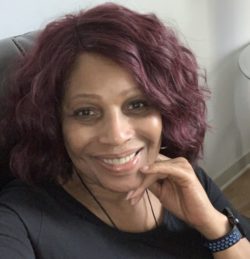
Also, Black patients are more likely than the average population to undergo diabetes-related lower-limb amputations.
Nancy Baines is among the 21 percent of African-Americans determined to not get vaccinated. “But it has nothing to do with history,” insists the 69-year-old woman during a Zoom call from her Atlanta home. She fears that vaccine development was rushed, and trials weren’t performed thoroughly enough.
Baines works as an office assistant at First Baptist Church of Decatur. She and Hampton have a good relationship, she says. They sometimes share jokes but comfortably agree to disagree on the vaccine issue.
There’s another reason for her hesitancy. “I don’t like to take medication as a whole,” Baines says. She took medicine for diabetic neuropathy that didn’t help. A few years ago, she received a shingles vaccine, which gave her an allergic reaction. Baines says she and her family are adamant about wearing masks and social distancing. But when it comes to medical care, “I totally rely on God for healing and protection,” she says.
Black Americans are more religious than any other ethnic group in the U.S. Almost 80 percent identify as Christians, according to a Pew survey.
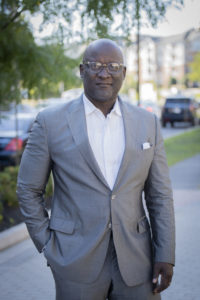
That’s why churches are uniquely positioned to provide public health education, says Dr. Terris King. He’s the pastor of Liberty Grace Church of God in Baltimore and has a Ph.D. in occupational science. He had a 35-year career in government health care, mostly for the federal Centers for Medicare and Medicaid Services (CMS), where he established the Office for Minority Health.
“It’s the church’s responsibility to guide its people in a way that impacts the individual holistically, the mind, the body and the soul,” says King. “And the health piece aligns with that completely.”
King was a pioneer in combining religion and health care long before COVID hit. For years, he’s worked with Johns Hopkins University and the Maryland Food Bank to educate on nutrition and to distribute fresh food. He’s rallied public health organizations to provide blood pressure and HIV screenings at his church.
With COVID, he’s taken his approach to a new level. He partnered with the University of Maryland, the Baltimore Health Department and other area organizations for a program to reach out to three places essential in African-American life: churches, barbershops and beauty salons.
“These are the places where we talk about our fears,” says King. “And the idea is to educate people who run these places so that they can help their congregants and their customers separate facts from fiction.”
At Liberty Grace, King has invited experts from Johns Hopkins School of Public Health and other health institutions in his area. He has also brought in representatives from pharmaceutical giants like Sanofi and Pfizer. Parishioners had the opportunity to ask questions – about the vaccine research, the efficacy, and possible side effects.
Before lobbying for vaccination, he says, it’s important to first listen and acknowledge the skepticism. “Of course, African-Americans are hesitant toward a system that has historically mistreated them. It would be abnormal for them to be trustful,” he says.
But with a continued focus on education, he believes that the number of Black Americans willing to take the vaccine will increase.
In Georgia, institutions like Morehouse School of Medicine, as well as state and county health boards have partnered with Black and Hispanic churches for similar community outreach programs.
Last summer, Big Bethel AME Church, the oldest African American congregation in Atlanta, opened its 300-car parking lot for a COVID test site run by the Fulton County Health Department and the Community Organized Relief Effort. “Many of our members have taken advantage of this opportunity,” says the Rev. Dr. John Foster.
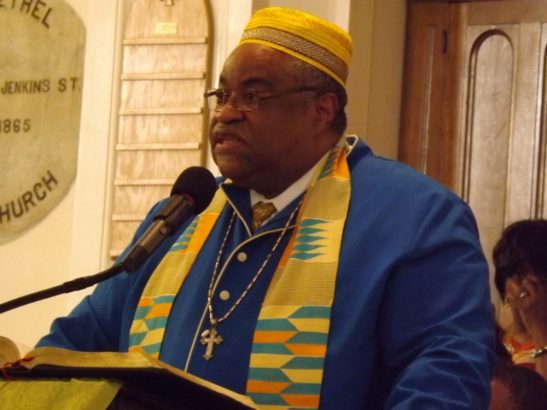
He and his staff are frequently mailing flyers and addressing questions about the coronavirus during church services, in phone and Zoom calls. They’re also sending out instructions by email on where and how to get signed up to get the vaccine.
But the vaccine rollout in Georgia has had a messy start, and it’s still in its early stages, says Foster. That’s why he doesn’t know how many of his 900 congregants have received their first or second dose. “But, anecdotally, I can tell you that I’ve heard from 50 or more members who called and said, ‘Pastor, I got my shot yesterday.’ ’”
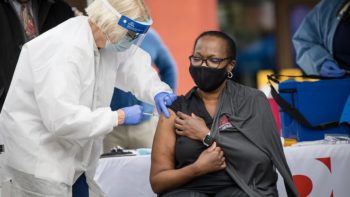
Foster says very few of his congregants are wary. “Overall, the enthusiasm among our members is high, and the vast majority see the vaccine as a blessing.”
He isn’t surprised. After all, he says, the vast majority of African Americans voted to elect Joe Biden as president in November – about 90 percent, according to preliminary numbers published by the AP. Biden ran a heavily pro-science and pro-vaccination campaign. As president, his number-one effort is to ramp up vaccine production and distribution.
Foster adds that Bishop Reginald T. Jackson, who oversees over 500 AME churches in Georgia, also encourages people to get vaccinated. “Leadership really matters here,” says Foster.
To act as role models is the most practical, most powerful part that clergy can play in boosting trust in vaccination among African Americans, says political science professor Owens. “If we were to see a great number of photos and social media posts about Black church leaders getting their shots, that would go a long way towards driving down some of the concern.”
Leading by example is not limited to faith leaders, though. Entertainment giant Tyler Perry recently broadcast his own vaccination on TV. The late baseball Hall of Famer Hank Aaron, former U.N. Ambassador and civil rights leader Andrew Young, and former U.S. Health and Human Services Secretary Louis Sullivan all got publicly vaccinated against COVID-19 in a brand-new health clinic at the Morehouse School of Medicine.
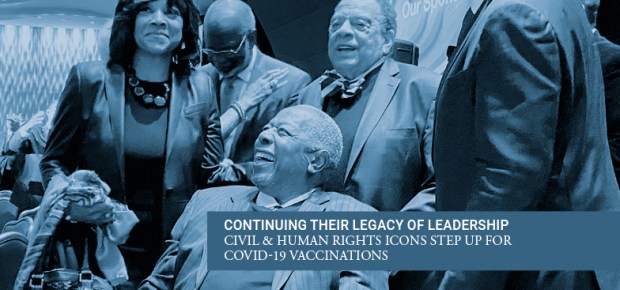
“I hope you do the same,” Aaron wrote on Twitter. He passed away 17 days later, aged 86, from a cause unrelated to the vaccination.
Morehouse School of Medicine assembled iconic civil rights leaders for a reason. “They marched to the polls to secure our rights,” Valerie Montgomery Rice, the school’s president, said in a statement. “And now, they are rolling up their sleeves to save lives.”
David Jordan, the senior pastor at First Baptist Church of Decatur, certainly plans on getting the vaccine once it’s his place in line. Since the beginning of the pandemic, his church, which has an ethnically diverse membership, has focused on education, information and communication.
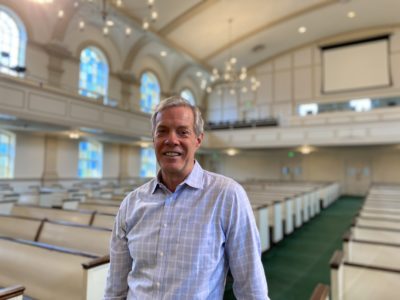
Jordan, who is white, says the majority of his congregants are older, “and they are anxious to get the vaccine simply because they’re tired of being cooped up in their homes.” The hesitancy that some might have “is overridden by the desire to be free again.”
In March, First Baptist established a coronavirus task force that works closely with public health officials, doctors and scientists. “Our job is to gather as much valid data and information as we can,” Jordan says. “But ultimately, we have to leave it to our members to decide what they want to do.”
Nancy Baines says she follows news reports about the vaccine rollout, as well as updates coming from her church’s coronavirus task force. “But I will not reconsider,” she says. “My decision is solid. I will never, ever get the vaccine.”
Randall Hampton got his second shot last week. His 93-year-old mother is fully vaccinated, too. He’s familiar with the dark history of medical care for African-Americans, but he didn’t let that bother him. “You know, that’s the past, and I prefer to live in the today,” he says.
Katja Ridderbusch is an Atlanta-based journalist who reports for news organizations in the U.S. and her native Germany. Her stories have appeared in Kaiser Health News, U.S. News & World Report and several NPR affiliates.

